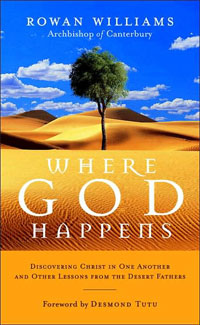Book Notes
 Rowan Williams, Where God Happens; Discovering Christ in One Another (Boston: New Seeds, 2005), 174pp.
Rowan Williams, Where God Happens; Discovering Christ in One Another (Boston: New Seeds, 2005), 174pp.
The bland title of this book gives no hint of its powerful subject matter or of its important message. Rowan Williams, Archbishop of Canterbury and the leader of the worldwide Anglican church, introduces the Egyptian desert fathers and mothers of the fourth century in such a way as to show how and why they remain so relevant for today. I count this as one of the best books on Christian discipleship or formation that I have read in the past year.
If you are unfamiliar with desert monasticism this book is an excellent place to start. An introduction situates the monastic movement in its day and age, suggests some of its salient characteristics and themes, disabuses us of superficial caricatures, makes liberal use of primary sayings and stories from the monastics, and, best of all, suggests specific contemporary applications for church life today. Williams is not only a notable scholar; he is an excellent writer with enviable pastoral sensitivities. In four chapters he examines Life, Death, and Neighbors; Silence and Honey Cakes; Fleeing; and then Staying. The book concludes with a substantial collection of the sayings of the desert fathers organized by theme—hospitality, obedience, modesty, charity, discretion, humility, and so on (pp. 123–161). An all too brief bibliography suggests further reading.
Probably no one who reads this book will become a monk, but that is besides the point. One of the desert mothers, Amma Syncletica, explains: "There are many who live in the mountains and behave as if they were in the towns. You can be solitary in your mind even when you live in the middle of the crowd. And you can be a solitary and still live in the middle of the crowd of your own thoughts." For the desert monastics of the fourth century, and for us today, the interior geography of your heart is far more important (and complex) than the exterior coordinates of your address. Whether dealing with the prosaic boredom of everyday life, conformity to culture, our individualist impulses, our rosy romanticism that exudes naivety ("Expect trials until your last breath," advised one father), flight from responsibility, the terrors of temptation, discouragement and its concomitant lethargy, or the ego's endless quest for self-justification, these saints are competent advisors. Their wisdom comes from hard fought experience and is not arid theory. Contrary to common misperceptions, these faithful guides are people of tenderness, honesty, humor and humility. We Christians need their wisdom more than ever, and this book is a fine place to begin.


